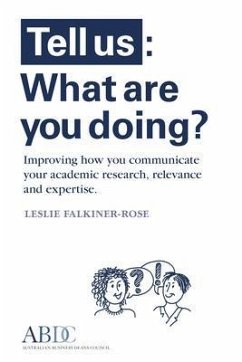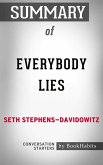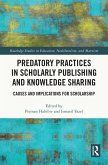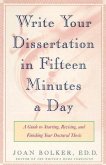Tell Us: What are you doing? Improving how you communicate your academic research, relevance and expertise.
Learn from the best. Communicate widely and well. Hear the practical tips, examples and candid comments from in-depth interviews with high-profile academics and journalists in Australian and international media. This easy-to-read guide will help researchers, tertiary students, academics and anyone else who wants to hone their skills to maximise the reach and impact of their knowledge and work.
Why do we need this guide?
For some, translating their views and work to be easily understood by lay people can be akin to pulling teeth. For others, it's a rewarding and enjoyable experience, which can markedly boost their own public profile and that of their organisation.
There's no doubt that learning to operate in a world beyond your immediate patch may feel foreign and uncomfortable at first. But, as any traveller knows, building knowledge and having a mind open to adapting to new cultures does foster familiarity and confidence.
In this guide, those working at the coalface discuss how to overcome communication challenges and create ongoing opportunities. We also look at research and draw on the ABDC communications advisor's 40-plus years of experience in journalism and strategic communication to help improve your communications.
Book excerpt: Tin rattling, testing and telling it like it is
Picture this: you've had a good day. You have discovered something exciting and are dying to tell your nearest and dearest. At home you walk in to discover family members or friends intensely discussing an unrelated topic.
They look up, say 'hi' briefly, and go back to their conversation. There's no pause or easy opening in which to share your news. But you are passionate and determined so you quickly find a way to broadcast your message to the room.
There are several key ingredients here:
If you can nail all those points in all your communications and know how to effectively distribute your messages, then you can probably stop reading now. After all, there are no secret ingredients or dark arts at work here.
However, while the principles are straightforward, there are endless variations on the themes. Communicating well is always a work in progress that changes with each circumstance, topic, platform and medium used.
Learn from the best. Communicate widely and well. Hear the practical tips, examples and candid comments from in-depth interviews with high-profile academics and journalists in Australian and international media. This easy-to-read guide will help researchers, tertiary students, academics and anyone else who wants to hone their skills to maximise the reach and impact of their knowledge and work.
Why do we need this guide?
For some, translating their views and work to be easily understood by lay people can be akin to pulling teeth. For others, it's a rewarding and enjoyable experience, which can markedly boost their own public profile and that of their organisation.
There's no doubt that learning to operate in a world beyond your immediate patch may feel foreign and uncomfortable at first. But, as any traveller knows, building knowledge and having a mind open to adapting to new cultures does foster familiarity and confidence.
In this guide, those working at the coalface discuss how to overcome communication challenges and create ongoing opportunities. We also look at research and draw on the ABDC communications advisor's 40-plus years of experience in journalism and strategic communication to help improve your communications.
Book excerpt: Tin rattling, testing and telling it like it is
Picture this: you've had a good day. You have discovered something exciting and are dying to tell your nearest and dearest. At home you walk in to discover family members or friends intensely discussing an unrelated topic.
They look up, say 'hi' briefly, and go back to their conversation. There's no pause or easy opening in which to share your news. But you are passionate and determined so you quickly find a way to broadcast your message to the room.
There are several key ingredients here:
- You have something worthwhile to say
- That something matters to you and your audience
- You understand the key interests of those in your audience
- You know where they hang out and you meet them in that place
- You enthusiastically and knowledgeably explain why the news is important
- You concisely and clearly explain the key elements of the news
- You talk in language they all understand
- What you say resonates beyond the moment you say it.
If you can nail all those points in all your communications and know how to effectively distribute your messages, then you can probably stop reading now. After all, there are no secret ingredients or dark arts at work here.
However, while the principles are straightforward, there are endless variations on the themes. Communicating well is always a work in progress that changes with each circumstance, topic, platform and medium used.
Dieser Download kann aus rechtlichen Gründen nur mit Rechnungsadresse in A, D ausgeliefert werden.









